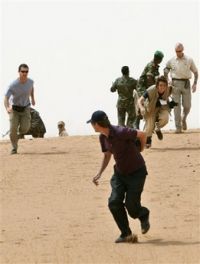Controls tighten on media and aid workers in Darfur
Nov 8, 2006 (KULBUS, Sudan) — Sudan has tightened restrictions on aid workers and journalists travelling to Darfur, and analysts say the aim is to conceal renewed hostilities between rebels and the army.
 Journalists have been detained, aid workers obstructed and rules changed weekly for foreigners in the strifetorn region.
Journalists have been detained, aid workers obstructed and rules changed weekly for foreigners in the strifetorn region.
A British Sunday Times reporter this week was detained on arrival at the main airport, initially on the grounds she was wearing a cap belonging to a different news organisation. Then her passport was seized over alleged irregularities.
She is just one example.
“Definitely there’s been a massive crackdown in the last few months,” said Leslie Lefkow of Human Rights Watch. “It’s the same old pattern of the government in trying to restrict the flow of information.”
“They’ve managed to conduct a massive media campaign that is subverting the reality of what’s happening in Darfur.”
She said the two main targets were journalists and non-governmental organisations (NGOs). Darfur has the world’s largest aid operation, with 14,000 aid workers supplying humanitarian help to miserable camps in the region.
The stakes are high. An estimated 200,000 people have been killed and 2.5 million displaced in fighting since mostly non-Arab rebels took up arms in Darfur in 2003.
Khartoum and one Darfur faction signed a peace deal in May, but violence has erupted again after a new alliance of guerrillas who reject the accord resumed hostilities.
African Union and U.N. officials say the army has suffered heavy losses and the government does not want that made public.
Last month U.N. mission head Jan Pronk was expelled after saying the army had suffered two major defeats at the hands of the rebels.
SUDAN DENIES BLOCKING MEDIA
Sudan denies it prevents reporting. It has regularly issued permits for journalists to go to Darfur, but said on Tuesday it had temporarily stopped doing so. One official said that was to smooth procedures for journalists arriving in Darfur.
Khartoum and Darfur authorities do not always appear to see ey-to-eye.
A foreign TV crew last month was detained after authorities in Darfur’s main town el-Fasher said they did not recognise the Interior Ministry stamp extending their visas. A Western newspaper reporter was detained for a day on the grounds Khartoum officials had made a typing error on his travel permit.
Sudan has reimposed censorship on the country’s own independent papers although its new constitution enshrines press freedom. Media rights group Reporters Without Borders said at least 15 journalists had been arrested this year.
“The Sudanese media, especially Arabic newspapers, toe the government line on key issues such as Darfur,” said Peter Takirambudde, Africa director of Human Rights Watch.
The country head and Darfur coordinator of Medecins Sans Frontieres Holland were arrested last year after the group published a report on hundreds of rapes in Darfur. Khartoum denies rape is widespread.
Authorities also obstruct aid staff working in Darfur with a myriad permit requests, although Khartoum has promised in writing to provide free access for the humanitarian community.
“They make it very clear. They want to drastically reduce the number of NGOs in Darfur, and regain control,” said one Western aid worker who asked to remain anonymous to protect her organisation, which is under threat of expulsion.
(Reuters)
